| Article ID | Journal | Published Year | Pages | File Type |
|---|---|---|---|---|
| 5557720 | Pharmacology & Therapeutics | 2017 | 14 Pages |
Controlling the spread of carcinoma cells to distant organs is the foremost challenge in cancer treatment, as metastatic disease is generally resistant to therapy and is ultimately incurable for the majority of patients. The plasticity of tumor cell phenotype, in which the behaviors and functions of individual tumor cells differ markedly depending upon intrinsic and extrinsic factors, is now known to be a central mechanism in cancer progression. Our expanding knowledge of epithelial and mesenchymal phenotypic states in tumor cells, and the dynamic nature of the transitions between these phenotypes has created new opportunities to intervene to better control the behavior of tumor cells. There are now a variety of innovative pharmacological approaches to preferentially target tumor cells that have acquired mesenchymal features, including cytotoxic agents that directly kill these cells, and inhibitors that block or revert the process of mesenchymalization. Furthermore, novel immunological strategies have been developed to engage the immune system in seeking out and destroying mesenchymalized tumor cells. This review highlights the relevance of phenotypic plasticity in tumor biology, and discusses recently developed pharmacological and immunological means of targeting this phenomenon.
